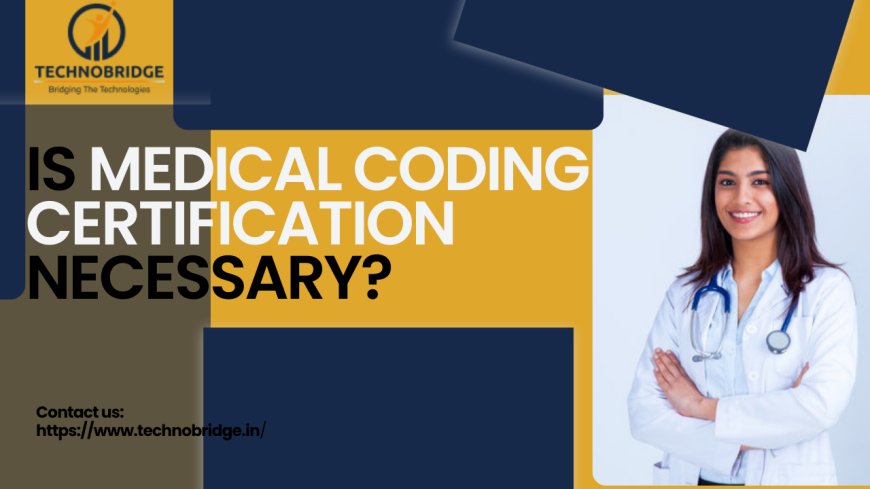Is Medical Coding Certification Worth It?

Medical coding certificates are essential for efficient operations in the healthcare sectorWhile accreditation is a coveted credential in this competitive industry, it's not universally mandated by law across all states. Nonetheless, the significance of certification cannot be overstated, as it enhances credibility and opens doors to better career opportunities. This article delves into the pivotal role of certified medical coders, highlighting the benefits they bring to healthcare organizations. It also outlines the rigorous procedures involved in obtaining certification, offering valuable insights for aspiring coders looking to navigate their career path effectively.
Why is Medical Coding Certification Important?
While some entry-level medical coding positions might not explicitly require certification, it offers a multitude of advantages for aspiring coders:
• Improved work Prospects:
In today's competitive healthcare landscape, a medical coding certification acts as a powerful key unlocking a world of improved work prospects. It demonstrates your dedication to the field, verifies your proficiency in medical terminology and coding systems, and positions you as a valuable asset to potential employers..
• Greater Earning Potential:
Research indicates that certified medical coders often make more money than their non-certified colleagues. According to the American Academy of Professional Coders (AAPC), certified coders can make up to 20% of their income.
• Verified Skills and Knowledge:
Earning a medical coding certification signifies you've conquered a rigorous exam, proving your grasp of CPT and ICD-10-CM coding systems alongside healthcare compliance regulations and medical coding fundamentals. This not only validates your expertise but also inspires confidence in potential employer.
• employment Advancement Opportunities:
Obtaining a certification allows one to pursue a greater variety of employment options in the medical coding industry. You can advance to auditing or supervising jobs with more experience and qualifications, or you can even specialize in a particular field like cardiology or ophthalmology coding.
• Exhibited Professionalism:
A certification attests to your commitment to lifelong learning and keeping abreast of the rapidly changing healthcare environment. Employers and coworkers may find great value in its portrayal of professionalism and dedication to excellence.
Types of Medical Coding Certifications
The two main organizations offering nationally recognized medical coding certifications are:
• The American Academy of Professional Coders (AAPC):
AAPC offers a variety of medical coding courses specifically designed for the medical coding industry. The basic course for outpatient coding is the Certified Professional Coder (CPC), while the Certified Inpatient Coder (CIC) focuses more on hospital settings.
The AHIMA (American Health Information Management Association):
The AHIMA offers credentials that cover a wider range of health information management; certain qualifications also coincide with medical coding. A thorough certification that addresses both inpatient and outpatient coding is the Certified Coding Specialist (CCS).
Choosing the Right Certification
The ideal certification for you depends on your career goals and area of interest. Here are some factors to consider:
Entry level vs. advanced: Are you new to medical coding or do you have some experience? There are certifications available for both beginners and experienced coders.
Inpatient vs. outpatient: Do you want to focus on coding for hospitals or physician offices? There are specific certifications for each setting.
Learning Style: Both organizations provide self-paced study materials, instructor-led courses, and online learning in pharmacovigilance and medical coding. Select a format that suits your learning style and schedule.
Specific specialty: Are you interested in a particular area of medicine, such as cardiology or pediatrics? There are certifications available for some specialties.
Employer requirements: Some employers may require specific certifications for their open positions.
The Path to Becoming a Certified Medical Coder
Here's a general roadmap for obtaining a medical coding certification:
1. Education: There are two main paths to a medical coding career: formal education and on-the-job training. You can enroll in certificate programs offered by community colleges, vocational schools, or online platforms. These programs typically take less than a year and prepare you for certification exams. Alternatively, some employers may train you on the job, but a certificate can still give you a competitive edge and open up more opportunities.
2. Certification Exam: Once you feel prepared, register for the chosen certification exam. Both AAPC and AHIMA offer detailed information regarding eligibility requirements, exam content, and registration processes on their respective websites [Source: AAPC], [Source: AHIMA].
3. Continuing Education: Meeting regulatory requirements typically involves completing continuing education (CE) credits every few years. This helps ensure you remain current with the latest coding guidelines and industry changes.
Conclusion
Medical coding certification is a valuable investment for anyone seeking a fulfilling career in the healthcare field. It equips you with the necessary skills and knowledge to excel in this dynamic profession, opening doors to promising job opportunities and career advancement. By considering your interests and goals, you can choose the right certification path and unlock a rewarding future in medical coding.












